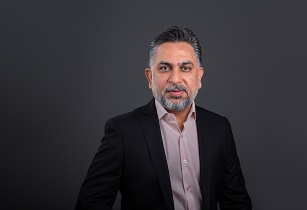Naveed Kashif, Nokia’s head of southern Africa cluster and customer business team for MTN Group, explores the direction of the company following its recently announced rebrand
Earlier this year, at MWC Barcelona 2023, Nokia unveiled a refreshed brand as part of its long-term strategic transformation to deliver sustainable, profitable growth. The company has revamped its look to more clearly signal who it is today: a B2B technology innovation leader dedicated to realising the potential of digital in every industry.
African Review spoke to Kashif to find out more about Nokia’s journey:
African Review (AR): What prompted the updated strategy and rebrand?
Naveed Kashif (NK): The brand refresh directly supports Nokia’s company and technology strategy to deliver sustained long-term growth as we capture the opportunity of digital transformation in every industry.
The new logo reflects the energised, dynamic and modern Nokia of today: a B2B technology innovation leader playing a pivotal role in an increasingly digital world, driving productivity, sustainable growth, and inclusive access. It underpins our strategy to be solely focused on being a B2B technology innovation leader and scale the B2B business as we capture the opportunity of digital transformation.
The refreshed brand is a visual representation of Nokia’s purpose: ‘to create technology that helps the world act together’. Created from five abstracted letterforms, each works together to read as ‘Nokia’. This is symbolic of our belief in collaboration. We are bringing together customer and partner ecosystems to create tomorrow’s digital services and applications – delivering collaborative advantage, together.
AR: Why have you identified the need to develop ESG into a competitive advantage?
NK: Sustainability is a core component of Nokia business and technology strategies. The way we see it, there is no green without digital. Last year, we announced our enhanced ESG strategy, designed to maximise Nokia’s impact. Combining its technology, solutions and capabilities to address some of the biggest global challenges, the strategy also aims to create increased value. We have been chosen as one of the most ethical companies for several years in a row. We pride ourselves on our ethics and compliance practices.
AR: How important do you consider the African and Middle East regions to the company?
NK: The Middle East and Africa have quickly expanded, adapted and evolved to meet the challenges of the 21st century. The region has a rich history and a diverse ecosystem of critical industries that keep the world’s societies and economies moving forward.
While known best for its rich oil and gas resources, the Middle East and Africa also leads the world in low-carbon footprint desalination technology. It boasts a strong mining market with over 400 mines supplying the world with copper, iron, gold and titanium – essential elements to the construction industry, consumer electronics, communication networks, and more.
With so many key global industries, the region is a key market for digitalisation. This allows enterprises to build greater resilience for their business and their operations. Helping to address supply chain challenges, but also providing the tools needed to diversify business models for the future. Whether it’s connected sensors and infrastructure for monitoring environmental conditions or optimising operations to create less waste, digitalisation holds the key.
Nokia’s products and services are at the very heart of digital age development. We are dedicated to bringing technologies like 5G, private campus networks and modernised mission-critical IP/MPLS networks to enterprises, delivering solutions that go far beyond “good coverage”. Our solutions for enterprises provide the elements needed to support productivity-enhancing operational tools like digital twins and AR-guided work instruction. They are essential for increased automation for port operations and mining, and remote communications coverage for renewable energy operations. Our society-critical network technologies allow for improved situational awareness for public safety and accessibility to smarter citizen services.
Read the full interview in the latest issue of African Review here.





















